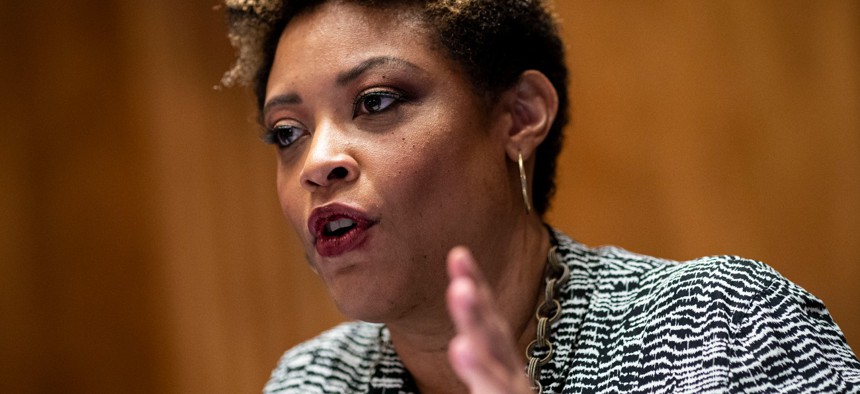
Pool/Getty Images
Biden’s OMB Nominee Plans to Keep Prioritizing Oversight and Ending Government Shutdowns
Shalanda Young has been acting OMB director for almost a year.
President Biden’s pick to lead the Office of Management and Budget recommitted on Tuesday to oversight, working to end government shutdowns and making the federal government more efficient.
After months of speculation, Biden announced in late November the nominations of Shalanda Young and Nani Coloretti for OMB director and deputy director, respectively. Biden pointed out that their appointments would make Young the first Black woman to hold the post and Coloretti one of the most senior Asian-American leaders in the government.
Young, a veteran of the House Appropriations Committee, has been serving as acting OMB director since the end of March 2021 when she was confirmed as deputy director, following the withdrawal of Neera Tanden’s nomination for the top job. Lawmakers from both parties called on the administration to tap Young for the director role. Nani Coloretti is currently a senior vice president at the Urban Institute. She previously served in senior roles at the Housing and Urban Development and Treasury departments and Consumer Financial Protection Bureau.
“If confirmed, I will continue to work closely with you and your colleagues to deliver for the American people,” said Young testified before the Senate Homeland Security and Governmental Affairs Committee on Tuesday morning, along with Coloretti. “And I will continue to find common ground, to be responsive, and to rebuild the career staff at OMB who play an essential role in ensuring our government works for all Americans.”
She said some of her highlights from the past 10 months at OMB were standing up the Made in America Office; taking action “to make the federal government more efficient, effective, and accountable to the public, such as through the president’s executive order on improving government customer service; and “restoring the integrity and independence of their inspectors general.” Young mentioned several times throughout the hearing guidance OMB issued in December that instructed agencies on how to work better with their inspectors general.
During the hearing, Sen. Rob Portman, R-Ohio, ranking member of the committee, expressed frustration that he hadn’t been able to get certain documents from OMB, including some related to the pandemic, as part of his oversight efforts.
In response, Young told the former OMB director that “whatever we can provide” they will.
When asked about shutdowns, Young said though she didn’t know the specifics of Portman’s End Government Shutdowns Act, “you can count me in on any effort, it has to be a bipartisan effort, to get out of this cycle of potential shutdown, threat of a shutdown, and for that matter any threat of debt ceiling breach” as “just threat of those is detrimental to the economy.” Portman’s bill only has Republican co-sponsors, but there was another recent bipartisan effort as well.
The current continuing resolution to fund the government runs out on Feb. 18 and Young told lawmakers, “I personally, given my former role, have a great interest to make sure we don’t get to the brink of that with any fanfare.”
In introducing Young, Sen Patrick Leahy, D-Vt., chairman of the Senate Appropriations Committee, noted that she had “helped end the longest shutdown in U.S. history,” which lasted from Dec. 22, 2018 to Jan. 25, 2019.
Young also committed to continuing to support legislation introduced by Sens. Maggie Hassan, D-N.H., and Mike Braun, R-Ind., that would establish a system to identify and eliminate wasteful federal programs as well as other ways to save taxpayer dollars.
On regulations, Young said efforts to fulfil Biden’s day one memo to “modernize and improve the regulatory review process” are still underway.
“We’re trying to find the sweet spot” on the use of cost-benefit analysis, a much-debated tool, she said. “You haven’t seen anything come out on this because we are taking a methodical view on this. We’re not moving quickly.”
Coloretti said based on her experience at Treasury and HUD she has a “deep appreciation” for the role of the Office of Information and Regulatory Affairs in coordinating the regulatory process. The interim political leader at OIRA, which is housed at OMB, is stepping down from her role this week and a career official temporarily took over. Biden has yet to name a nominee for administrator.
Sen. Gary Peters, D-Mich., chairman of the committee, asked Young about her takeaways from the Omicron variant, particularly efforts by the Safer Federal Workforce Task Force, which includes OMB, and what lessons she learned for the task force response going forward.
“Just like every CEO and company in this country, there was one plan in which to bring workers back to office. The Omicron variant definitely made us go back to the drawing room table,” said Young. “The Safer Federal Workforce [Task Force] puts out guidelines we expect all the agencies to work through, but we leave the actual decisions on operations to the agencies while providing some overarching guidance.”
She added that some agencies are trying to bring people back to the workplace now, but noted that certain cadres of federal employees, such as border patrol agents, have never worked remotely.
“My takeaways [are], this is difficult, this is a one in a generation event, there is no playbook,” Young continued. “But I think we’ve been able to keep up variant specific situations and what we’re seeing is agencies are on track to – if they haven’t already – bring people in over the next month into March.”
Coloretti said if confirmed she would help support the efforts by Young and OMB deputy director for management, Jason Miller,, “across all agencies to make sure they are putting worker safety first, but also continuing to operate the federal government as it needs to be operated.”
The vaccine mandates for federal employees and contractors, both currently halted, did not come up during the hearing.
Young and Coloretti also testified before the Senate Budget Committee on Tuesday afternoon.







